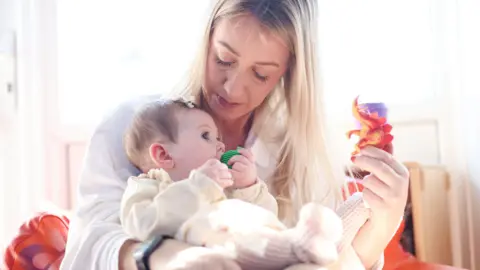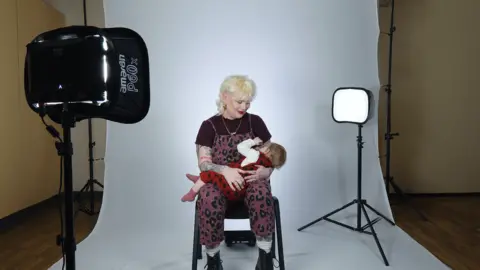Breastfeeding mums urged 'be kind to yourself'
 Redcar and Cleveland Council/Middlesbrough Council
Redcar and Cleveland Council/Middlesbrough CouncilMums breastfeeding their babies are being urged to "be kind to yourself".
Twelve mothers have recounted their experiences as part of a campaign launched on Teesside in an effort to address a below-average rate of breastfeeding in the area.
One of those taking part in the Mamazing project, Hayley O'Sullivan from Ormesby, said she experienced early struggles but now remembers "beautiful moments" shared with her daughters.
The campaign has been organised by Middlesbrough and Redcar and Cleveland councils.
The mums, chosen to feature in the campaign via a competition, took part in a photoshoot with their images now displayed on ads across the south Tees area.
Stress 'doesn't last forever'
Mrs O'Sullivan, who has breastfed two daughters, said she hoped seeing and hearing the women's "raw and authentic" stories would be a powerful way to encourage take-up rates.
"You just expect the baby to make its way to the breast and to feed naturally. That didn't happen for me.
"With my first, we had so many issues in the beginning. She couldn't latch, sometimes she had to feed for more than an hour because a nipple shield was acting as a barrier to her getting all the milk she needed and she lost weight.
"There were so many times when I wondered whether I'd done the right thing, but after six to eight weeks I got support from a feeding specialist team and from local family hubs."
She recalled feeling like all her time was spent preparing for the next feed and "wondering if the baby's had enough".
"It's stressful and exhausting, but that doesn't last forever. Be kind to yourself. If you do nothing else in a day other than feed a baby then that's more than enough.
"I look back now and don't focus on the negatives. I remember the beautiful moments we had."
 Redcar and Cleveland Council/Middlesbrough Council
Redcar and Cleveland Council/Middlesbrough CouncilLorna Mulungi, of Middlesbrough, initially found things difficult with her baby and credits help from health professionals and her husband, Yassir, for making the situation easier.
"There was a point I was going to give up," she said. "I thought I couldn't do it because it was so painful and stressful.
"But with lots of practice and patience I finally got it. I also talked to health visitors and went to family hubs."
Emma Cooksey, who is also from Middlesbrough, describes herself as "heavily tattooed with piercings" and said she had been "pigeon-holed into not looking maternal enough – whatever that means".
Initially planning to breastfeed her daughter for two or three months, she has continued for 15.
"It got easier with the support I was given and as my body got used to it, so we just kept going," she explained.
"I didn't have to think about bottles or sterilising anything. It's there and on tap. We'll go on until she wants to stop."
 Redcar and Cleveland Council/Middlesbrough Council
Redcar and Cleveland Council/Middlesbrough CouncilAnne Rose, of Public Health South Tees, said breastfeeding rates in the area had "historically not been as high as the England average".
"It can be due to lack of community support, or [influence from] family and friend networks.
"It might be that new mums are following how their own mums fed their babies, and also there's the marketing of breast milk substitutes as well."
Other factors mothers often say make them reluctant include infections, such as mastitis, and disapproval from onlookers if they breastfeed in public.
What does the NHS say?
Breast milk is "tailor-made for your baby", according to the NHS. It says breastfeeding provides:
- Vitamins and minerals
- Protection from certain infections
- Reduced risk of SIDS (sudden infant death syndrome), childhood diabetes and leukaemia
- Protection for mothers by lowering their risk of breast cancer, ovarian cancer, osteoporosis (weak bones), diabetes and cardiovascular disease
